
David Essex is an English singer-songwriter and actor. From 1973 to 1994, he attained 19 Top 40 singles in the UK and 16 Top 40 albums. Internationally, Essex had the most success with his 1973 single "Rock On". He has also had an extensive career as an actor.
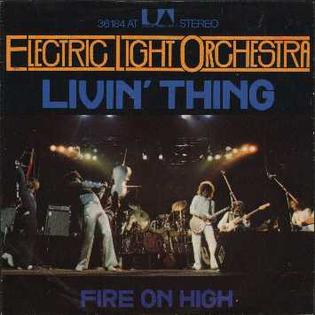
"Livin' Thing" is a song written by Jeff Lynne and performed by Electric Light Orchestra (ELO). It appears on ELO's 1976 album A New World Record and was also released as a single. Patti Quatro sang uncredited vocals, particularly the "higher and higher" parts.
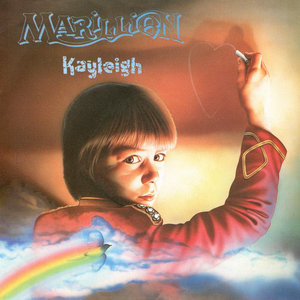
"Kayleigh" is a song by British neo-prog band Marillion. It was released as the first single from the concept album Misplaced Childhood. It is the band's most successful single in the UK, where it peaked at number two and stayed on the UK Singles Chart for a total of 14 weeks. It also became the band's most successful single worldwide, reaching the top 10 in Ireland, Norway, and West Germany. In the United States, it gave the band their sole appearance on the Billboard Hot 100 chart, reaching number 74 in October 1985.
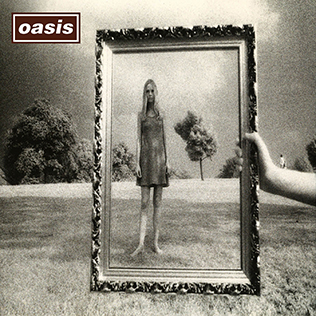
"Wonderwall" is a song by English rock band Oasis, released by Creation Records on 30 October 1995 as the fourth single from the band's second studio album (What's the Story) Morning Glory?. Described by lead guitarist and chief songwriter Noel Gallagher, who wrote the song and co-produced it with Owen Morris, as being about "an imaginary friend who's gonna come and save you from yourself", "Wonderwall" reached the top ten in 15 countries; it topped the charts in Australia and New Zealand, peaked at No. 2 on both the UK Singles Chart and the Irish Singles Chart, and reached the top ten in Canada and the United States at No. 5 and No. 8, respectively, thus becoming the band's sole top-40 entry on the latter country's main Billboard Hot 100 chart. The single was certified septuple platinum by the British Phonographic Industry (BPI) and 12-times platinum by the Australian Recording Industry Association (ARIA). Its music video, directed by Nigel Dick, won British Video of the Year at the 1996 Brit Awards.

"Whole Lotta Love" is a song by the English rock band Led Zeppelin. It is the opening track on the band's second album, Led Zeppelin II, and was released as a single in 1969 in several countries; as with other Led Zeppelin songs, no single was released in the United Kingdom. In the United States, it became their first hit and was certified gold. Parts of the song's lyrics were adapted from Willie Dixon's "You Need Love", recorded by Muddy Waters in 1962; originally uncredited to Dixon, a lawsuit in 1985 was settled with a payment to Dixon and credit on subsequent releases.

"I'm Gonna Be " is a song written and performed by Scottish duo the Proclaimers, and first released in August 1988 by Chrysalis as the lead single from their second album, Sunshine on Leith (1988). The song reached number 11 in the UK Singles Chart on its initial release and topped the charts of Australia, Iceland, and New Zealand.
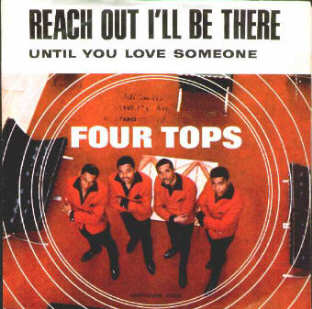
"Reach Out I'll Be There" (also formatted as "Reach Out (I'll Be There)") is a song recorded by American vocal quartet Four Tops from their fourth studio album, Reach Out (1967). Written and produced by Motown's main production team, Holland–Dozier–Holland, the song is one of the most widely-known Motown hits of the 1960s and is today considered the Four Tops' signature song.

"All by Myself" is a song by American singer-songwriter Eric Carmen, released by Arista in December 1975 as the first single from Carmen's debut album, Eric Carmen (1975). The verse is based on the second movement of Sergei Rachmaninoff's 1900–1901 Piano Concerto No. 2 in C minor, Opus 18. The chorus was taken from the song "Let's Pretend", which Carmen wrote and recorded with the Raspberries in 1972. The slide guitar solo was performed by studio guitarist Hugh McCracken.

"Bye, Bye, Baby " is a popular song written by Bob Crewe and Bob Gaudio. The Four Seasons' version of the song made it to No. 1 in Canada and No. 12 on the US Billboard Hot 100 in 1965. On the original issue of the single, the title was "Bye Bye Baby". However, on the album, The 4 Seasons Entertain You, and on later issues of the song, the name was changed to the longer, more familiar one. The song is about saying goodbye, not because the person is unloved but rather because the relationship is adulterous.

"Freedom" is a 1984 song by English pop duo Wham! from their album Make It Big, released on 1 October 1984. It became the group's second number one hit on the UK Singles Chart and reached number three in America. It was written and produced by George Michael, one half of the duo.
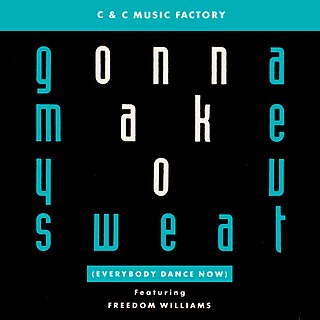
"Gonna Make You Sweat (Everybody Dance Now)" is a song by American dance music group C+C Music Factory, released by Columbia Records on November 18, 1990 as the lead single from their debut album, Gonna Make You Sweat (1990). The song is sung by Martha Wash and rapped by Freedom Williams; it was written by Robert Clivillés, Williams, and David Cole, and produced by Clivillés and Cole. The song charted internationally and achieved great success in Austria, Canada, Germany, Sweden, and the United States, where it reached number one on the dance charts. The accompanying music video was directed by Marcus Nispel, and features singer/dancer Zelma Davis lip-syncing to Wash's vocal parts. Billboard magazine ranked "Gonna Make You Sweat (Everybody Dance Now)" No.402 among the "500 Best Pop Songs of All Time" in 2023.

"Never Gonna Give You Up" is a pop song by English singer Rick Astley, released on 27 July 1987. Written and produced by Stock Aitken Waterman, it was released by RCA Records as the first single from Astley's debut studio album, Whenever You Need Somebody (1987). The song became a worldwide hit, initially in the United Kingdom in 1987, where it stayed at the top of the chart for five weeks and was the best-selling single of that year. It eventually topped charts in 25 different countries, including the United States and West Germany, and winning Best British Single at the 1988 Brit Awards. The song is widely regarded as Astley's most popular, as well as his signature song, and it is often played at the end of his live concerts.
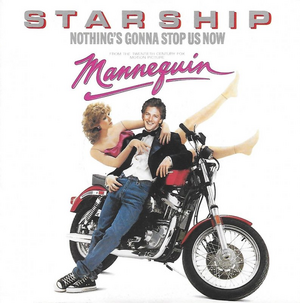
"Nothing's Gonna Stop Us Now" is a song co-written by Diane Warren and Albert Hammond and recorded by American rock band Starship for their second studio album, No Protection (1987). It is a power ballad duet featuring vocalists Grace Slick and Mickey Thomas and is the theme to the romantic-comedy film Mannequin.

"Nothing's Gonna Change My Love for You" is a song written by composer Michael Masser and lyricist Gerry Goffin. It was originally recorded by American singer and guitarist George Benson for his 1985 studio album 20/20, released by Warner Bros. Records. This original version was produced by co-writer Masser, and was released as a single in Europe only in 1985. In 1987, Hawaii born singer Glenn Medeiros released a version, which became a worldwide success.
"Any Dream Will Do" is a popular song written by Andrew Lloyd Webber and Tim Rice for the 1968 musical Joseph and the Amazing Technicolor Dreamcoat. It is generally the beginning and the concluding song of the musical, sung by the title character of Joseph.

"January" is a song by Scottish rock band Pilot. Written by the band's guitarist and singer David Paton and produced by Alan Parsons, it was released by EMI Records in January 1975 as the follow-up to the band's breakthrough single, "Magic". "January" gave Pilot their only number-one single in the UK, Ireland and Australia.

"Down Down" is a song by English rock band Status Quo, released by Vertigo Records on 29 November 1974. Written by Francis Rossi and Bob Young and produced by Status Quo, "Down Down" was Status Quo's only number one single on the UK Singles Chart. The single spent a week at the top of the chart in January 1975. Both "Down Down" and its B-side "Nightride" were taken from the album On the Level (1975), which had yet to be released. The album version lasts 5 minutes and 24 seconds, whilst the single version is 3 minutes and 49 seconds.

"Are You Gonna Go My Way" is a song by American musician Lenny Kravitz, released in February 1993 by Virgin Records as the first single from his third studio album, Are You Gonna Go My Way (1993). The song was written by Kravitz and Craig Ross, while Kravitz produced it. It peaked at number one in Australia and number four on the UK Singles Chart, as well as number one on the US Billboard Album Rock Tracks chart and number two on the Billboard Modern Rock Tracks chart. Its music video was directed by Mark Romanek.

"Everything's Gonna Be Alright" is a song by German-based music group Sweetbox. It was released in October 1997 as the second single from their debut album, Sweetbox (1998), the only album that had American singer Tina Harris as the group's frontwoman. The song is based on "Air" from Johann Sebastian Bach's Orchestral Suite No. 3, played on the track by the German Symphony Orchestra. "Everything's Gonna Be Alright" is the most successful song of Sweetbox worldwide; it reached the top five in Austria, France, Iceland, Ireland, Norway, Spain, Sweden, and the United Kingdom. Outside Europe, the song peaked at number 46 on the US Billboard Hot 100.

David Essex is the second studio album by British singer David Essex. It was released at the end of September 1974 and was produced, arranged and conducted by Jeff Wayne. It peaked at number two on the UK Albums Chart and was the Christmas number two album that year.


















